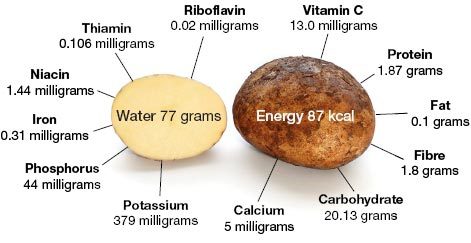girlgrowingsmall:fuckyeah-tonedandfit:THE BENEFITS OF SUGAR IN FRUITSThis idea that fruit is somehow a bad thing to eat came into full swing with the low carb diet craze, but the myth persists. Not a week goes by that I don’t hear someone tell me that they avoid fruit because it’s “all sugar” or “loaded with carbs.” So, I want to set the record straight and come to the defense of some of the world’s healthiest foods – fresh, whole fruits.I’ll tackle the “fruit is all sugar” statement first – because it’s just plain wrong. Fresh fruit offers so much more than the natural sugar it contains – including water, vitamins, minerals, fiber and phytonutrients (those naturally-occurring plant compounds that have wide ranging beneficial effects on the body). Where else can you get a package like that for about 75 calories per serving?The idea that fruit is “loaded with carbs” or is “full of sugar” needs to be put into perspective, too. It’s true that when you eat fruit, the overwhelming majority of the calories you consume are supplied by carbohydrate – mostly in the form of fructose, which is the natural sugar in the fruit.But that’s the nature not just of fruit, but of all plant foods – they’re predominantly carbohydrate (and that means not just natural sugars, but healthy starches as well as structural elements, like cellulose, that provide fiber). When you eat vegetables, the majority of the calories you’re eating come from carbohydrate, too. But you don’t hear people complaining that vegetables are “loaded with carbs.”Before dismissing foods as being loaded with sugar, or too high in carbs, consider not only the amount of sugar or carbs you’re eating, but the form of the carbohydrate, too. There’s a big difference between the nutritional value of the natural carbohydrates found in fruits and other plant foods – the sugars, starches and fibers – and what’s found (or, more accurately, what’s not found) in all the empty calories we eat from added sugars that find their way into everything from brownies to barbecue sauce.Faced with a serving of fruit, how much sugar are we talking about, anyway? An average orange has only about 12 grams of natural sugar (about 3 teaspoons) and a cup of strawberries has only about 7 grams – that’s less than two teaspoons. And either way, you’re also getting 3 grams of fiber, about a full day’s worth of vitamin C, healthy antioxidants and some folic acid and potassium to boot – and it’ll only cost you about 50 or 60 calories. “All sugar?” I think not.By contrast, a 20-ounce cola will set you back about 225 calories and, needless to say, won’t be supplying any antioxidants, vitamins, minerals or fiber. You’ll just be chugging down some carbonated water, maybe some artificial color and flavor, and somewhere in the neighborhood of 60 grams of added sugar (about 1/3 of a cup).You won’t get fat on eating fruit. You won’t be consuming an insane, over-the-top amount of sugar. Don’t be afraid of eating fruit, because they are the best thing you can give your body. read more..
Sunday, 24 June 2012
Natural Sugar-Carbohydrate-Plant Foods-Calories-Fruit
Friday, 25 May 2012
Grapefruit Seed Extract-Benefits Of Grapefruit-Grapefruit Juice-Breast Cancer-Heart Disease
myjournalofhealth:Benefits of Grapefruit
Heart and Anti Inflammatory Benefits
Grapefruit is very rich in Vitamin C, a nutrient that has been shown to alleviate cold symptoms and improve immune function. In addition to being an immunity-booster, the Vitamin C found in grapefruit has also been proven to help with chronic inflammatory conditions like arthritis and asthma. Adding grapefruit to your diet also promotes heart health and helps to prevent death risk from stroke and heart disease by decreasing inflammation, blood clotting, and acting as an anti-oxidant. Antioxidants discourage decay and death at a cellular level by inhibiting the absorption of oxygen.
Cancer Fighting Benefits
Grapefruit contains limonoids, which are chemical compounds that are known to fight different types of cancers, and there are compounds in grapefruit pulp that can help prevent breast cancer. Tobacco smoke contains cancer-causing agents that are activated by certain enzyme activity; this is reduced by daily consumption of grapefruit juice, which is a powerful anti-oxidant, which helps lower the risks of colon and lung cancers. The primary defense mechanism of the body against cancer is DNA repair, a process which is aided by Naringenin, a flavonoid concentrated in grapefruit.
Natural Disinfectant
In addition to the many grapefruit benefits that are provided by consuming the actual flesh of the fruit, grapefruit seed extract has been proven as an excellent disinfectant because it effectively eliminates germs. It is one of the most effective antimicrobial agents to be discovered and also acts as a natural disinfectant. As it has virtually none of the toxicity of other cleaning products, it has already been put to use in some American hospitals. It can be used around the home for safely cleaning chopping boards, cooking utensils and even your toothbrush on occasion.
Non-Toxic Rome Remedy
Grapefruit seed extract is a safe, non-toxic remedy for a variety of different pesky conditions such as dandruff, warts, and corns. It works to eliminate head lice and mites when other products fail, and can even be used on pets for skin conditions such as mange, fleas or to treat certain infections. Grapefruit seed extract (GSE) can also be used against water and food borne illnesses such as diarrhea and dysentery when traveling, and in the garden as a bug spray or to remove mold and fungus. Grapefruit benefits the skin, too, as a topical anti-acne remedy and aromatherapy agent. (x) read more..
Thursday, 24 May 2012
Potato Nutrition-Baked Potato-Fatty Acids-Daily Value-Nutrients
In order to be healthy, potatoes need to be prepared correctly. This means they are baked without salt and eaten skin and all. When cooked this way they contain a number of important vitamins and nutrients. They contain 48% of your daily value of vitamin C and 46% of your daily value of B-6. They also provide nutrients such as potassium, iron, and magnesium. They even contain 38.9 mg of omega-3 fatty acids. When additives like sour cream and butter are left off, potatoes are a very low fat food. Potato nutrition is a little more complex than you may have previously thought.Potatoes have more nutritional value than most people think. Depending on how they are prepared, potatoes can actually be very nutritious. They contain vitamins, nutrients, and omega-3 fatty acids. With these beneficial spuds, there is no need to feel guilty about indulging in a tasty baked potato.via owl.com read more..
Wednesday, 22 February 2012
Veggie-Fruits
Do you find yourself eating the same fruits & veggies over and over again? It's no wonder we get bored with them! http://on.self.com/wie0r9Easy Ways to Get Out of a Fruit or Veggie Ruton.self.comSELF Magazine: fashion, beauty, health, sex advice, news read more..
Wednesday, 15 February 2012
Fruits And Vegetables-Exotic Vegetable-Colorful Variety
February is Exotic Vegetable Month, according to the CDC. What’s the most exotic veggie you’ve ever tried? http://bit.ly/gwOEnA Fruits & Veggies Matter: Fruit & Vegetable of the Month: Exotic Vegetables | CDCwww.fruitsandveggiesmatter.govFruits & Veggies Matter: Home: Eat a Colorful Variety of Fruits and Vegetables Every Day for Better Health | CDC read more..



